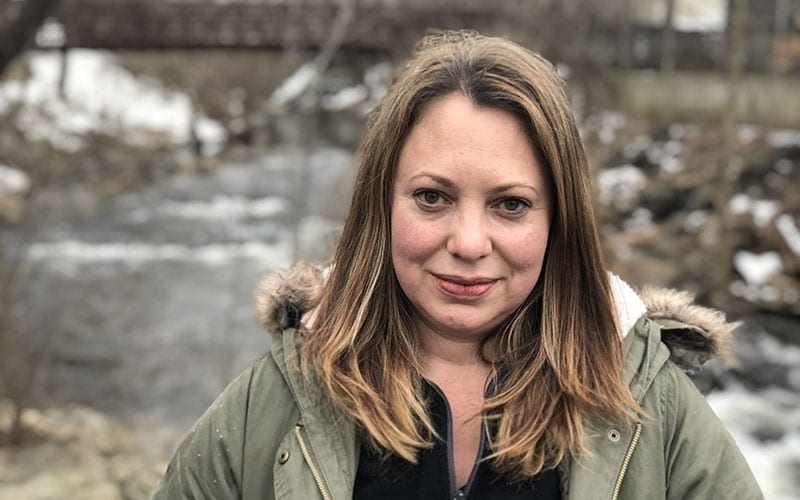Mara Bim’s path to Perkins began at an NRA prayer breakfast. And yes, there’s a story behind that.
Bim attended the breakfast for research in her role as artistic director of Cry Havoc Theater Company, the Dallas youth theater troupe she founded in 2014.
“We create original plays, and frequently ones on issues of social justice,” she said. Research often consists of conducting interviews with people with direct experience on each topic. In preparing to write a play about guns in America, eventually titled Babel, Bim and her teen co-creators joined the NRA and attended the convention in Dallas in 2018.
“The prayer breakfast was shocking to me,” she said. “I was there with Wes Magruder, who was my pastor at Kessler Park United Methodist at the time and who was attending the event in protest. Sitting next to him witnessing this was the first time I started contemplating about theology and how it’s misused.”
Another theater project, later titled Crossing the Line, took her and a group of teens to the southern border, where they met migrants and witnessed their suffering first-hand. Again, religion and faith were part of the picture. She met Catholic workers assisting migrants and spoke with a Methodist pastor who had traveled with the caravan.
“We visited a church with teenagers from a detention facility who were separated from their families,” she said. “Watching them cry at the feet of Mother Mary was particularly moving. So there’s been this religious theme in much of the work we’ve been doing, and that’s where my interest arose. After I came back from the border, I started seriously thinking about applying to Perkins.”
The lynchpin that led her to actually apply: the January 6 insurrection.
“Watching people pray and use the name of Jesus and God in that way was really upsetting to me,” she said. “I started my Perkins application right after that. I decided that if I wanted to be engaged in this conversation, I needed to learn more about theology.”
Bim started this fall, pursuing an M.T.S., and has a particular interest in women in the early church. She’s juggling her studies while continuing to run the theater company and raising a 5-year-old. She is a member of Kessler Park United Methodist Church in Dallas along with her husband, Brett. To stay grounded in the middle of all this, she meditates and prays almost daily. She also has a gratitude practice 15 years, similar to the Examen, in which she sits and expresses gratitude each night before bedtime.
The M.T.S. will be her third master’s degree. She earned an M.A. in performance studies at New York University and an M.S. in Education from the City College of New York.
In addition to being close to home, Perkins felt like a good fit for Bim.
“Everyone I’ve encountered at Perkins – administration, staff and faculty – truly seems to be invested in the program and the students,” she said. “Once I started engaging with the people here, it was a no-brainer.”
Bim has no definitive plans for using her Perkins degree, but is considering going on to earn a Ph.D.
“At this point I’m not interested in ordination,” she said. “I think my gift is as a storyteller.”
Her storytelling work at Cry Havoc Theater has garnered a good bit of media attention. In early 2020, D magazine declared that the youth theater company “is staging some of the boldest work in Dallas. Cry Havoc Theater is taking on some of our most pressing issues with empathy and nuance beyond its years.” Cry Havoc’s production of Crossing the Line, co-created with Tim Johnson and Kitchen Dog Theater, won multiple awards from the DFW Critics Forum. Recently, Bim was featured in D magazine’s September cover story, “78 Women Who Make Dallas Great.”
Bim believes the church can do a better job of storytelling. She wants to help tell a more constructive and more compelling story than the one that brought many angry Christian protestors to the capital on January 6.
“The church I attend is a reconciling United Methodist Church, and issues of social justice are very important to me,” she said. “The church hasn’t done a good job of communicating that aspect of its mission to the broader community.”
“I don’t know that I’m going to change any of their minds,” she said of the insurrectionists. “My hope is to speak to the people who have walked away from religion because all they see are the people at the insurrection saying they are doing it in the name of God. They don’t see the other strands of Christianity that do the good works and that are for social justice. So it’s those people that I think my storytelling is for. To say to them, ‘These people over here do not speak for all Christians. It’s not representative of the theology of many Christians.’ That’s where I see my calling.”
